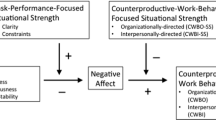Abstract
Using archival data from a large home improvement organization, the current study examined the incremental validity of conscientiousness over cognitive ability in predicting different performance criteria. Also, the study examined the effects of conscientiousness and cognitive ability on adverse impact. Results indicated that conscientiousness provided incremental validity over cognitive ability in the prediction of several performance criteria. Specifically, conscientiousness had the highest increases in validity over cognitive ability in the prediction of contextual performance factors (e.g., contextual performance, customer service orientation, dealing with others). However, the addition of conscientiousness failed to ameliorate the adverse impact associated with cognitive ability. In addition, limitations of the study and future directions of research are addressed.
Similar content being viewed by others
REFERENCES
Ackerman, P. L., & Heggestad, E. D. (1997). Intelligence, personality, and interests: Evidence for overlapping traits. Psychological Bulletin, 121, 219–245.
Barrick, M. R., & Mount, M. K. (1991). The Big Five personality dimensions: A metaanalysis. Personnel Psychology, 44, 1–26.
Borman, W. C., & Motowidlo, S. J. (1993). Expanding the criterion domain to include elements of contextual performance. In N. Schmitt & W. C. Borman (Eds.), Personnel selection in organizations (pp. 71–98). San Francisco: Jossey-Bass.
Campbell, J. (1990). An overview of the army selection and classification project (Project A). Personnel Psychology, 43, 335–354.
Costa, P. T., Jr., & McCrae, R. R. (1991). The Revised NEO Personality Inventory (NEOPI-R). Odessa, FL: Psychological Assessment Resources, Inc.
Day, D. V., & Silverman, S. B. (1989). Personality and job performance: Evidence of incremental validity. Personnel Psychology, 42, 25–36.
Eidson, C., Roth, P., Killen, T. L, Przybyla, B. K., & Fallon, J.D. (1999). Big five validity and adverse impact for customer service managers. Paper presented at the 14th Annual Conference of the Society for Industrial and Organizational Psychology, Atlanta, GA.
Hogan, R., Hogan, J., & Roberts, B. W. (1996). Personality measurement and employment decisions. American Psychologist, 51, 469–477.
Hough, L. M., Eaton, N. K., Dunnette, M. D., Kamp, J. D., & McCloy, R. A., (1990). Criterion-related validities of personality constructs and the effect of response distortion on those validities. Journal of Applied Psychology Monograph, 75, 581–595.
Howard, A. (1997). A reassessment of assessment centers: Challenges for the 21st century. Journal of Social Behavior and Psychology, 12, 13–52.
Hunter, J. E. (1980). Validity generalization for 12,000 jobs: An application of synthetic validity and validity generalization to the General Aptitude Test Battery (GATB). Washington, D.C.: U.S. Department of Labor. Employment Service.
Hunter, J. E., & Hunter, R. F. (1984). Validity and utility of alternative predictors of job performance. Psychological Bulletin, 96, 72–98.
Landy, F. J., & Farr, J. L. (1980). Performance ratings. Psychological Bulletin, 87, 72–107.
Landy, F. J., Shankster-Cawley, L., & Moran, S. K. (1995). Advancing personnel selection and placement methods. In A. Howard (Ed.), The changing nature of work (pp. 252–289). San Francisco, CA: Jossey-Bass. 105 J. M. AVIS, J. D. KUDISCH, AND V. J. FORTUNATO
Longnecker, C. O., Sims, H. P., & Gioia, D. A. (1987). Behind the mask: The politics of employee appraisal. Academy of Management Executive, 1, 183–193.
McHenry, J. J., Hough, L. M., Toquam, J. L., Hanson, M. A., & Ashworth, S. (1990). Project A validity results: The relationship between predictor and criterion domains. Personnel Psychology, 43, 335–354.
Motowidlo, S. J., & Van Scotter, J. R. (1994). Evidence that task performance should be distinguished from contextual performance. Journal of Applied Psychology, 4, 475–480.
Mount, M. K., & Barrick, M. R. (1995). The Big Five personality dimensions: Implications for research and practice in human resources management. In G.R. Ferris (Ed.), Research in personnel and human resource management (Vol. 13, pp. 153–200). Greenwich, CT: JAI Press.
Nunnally, J. C. (1978). Psychometric theory, (2nd ed.). New York: McGraw-Hill.
Ones, D. S., Viswesvaran, C., & Schmidt, F. L. (1993). Comprehensive meta-analysis of integrity test validities: Findings and implications for personnel selection and theories of job performance. Journal of Applied Psychology Monograph, 78, 679–703.
Ree, M. & Earles, R. (1992). Intelligence is the best predictor of job performance. Current Directions in Psychological Science, 1, 86–89.
Ryan, A. M., Ployhart, R. E., & Friedel, L.A. (1998). Using personality testing to reduce adverse impact: A cautionary note. Journal of Applied Psychology, 83, 298–307.
Schmidt, F. L., & Hunter, J. E. (1998). The validity and utility of selection methods in personnel psychology: Practical and theoretical implications of 85 years of research findings. Psychological Bulletin, 124, 262–274.
Schmitt, N., Gooding, R.Z., Noe, R.A., & Kirsch, M. (1984). Meta-analyses of validity studies published between 1964 and 1982 and the investigation of study characteristics. Personnel Psychology, 37, 407–422.
Schmitt, N., Rogers, W., Chan, D., Sheppard, L., & Jennings, D. (1997). Adverse impact and predictor efficiency of various predictor combinations. Journal of Applied Psychology, 82, 719–730.
Thomson, A. (1999). Industry output and employment projections to 2008. Monthly Labor Review, 33–50.
Viswesvaran, C., Ones, D. S., & Schmidt, F. L. (1996). Comparative analysis of the reliability of job performance ratings. Journal of Applied Psychology, 81, 557–574.
Author information
Authors and Affiliations
Corresponding author
Rights and permissions
About this article
Cite this article
Avis, J.M., Kudisch, J.D. & Fortunato, V.J. Examining the Incremental Validity and Adverse Impact of Cognitive Ability and Conscientiousness on Job Performance. Journal of Business and Psychology 17, 87–105 (2002). https://doi.org/10.1023/A:1016200317002
Issue Date:
DOI: https://doi.org/10.1023/A:1016200317002




